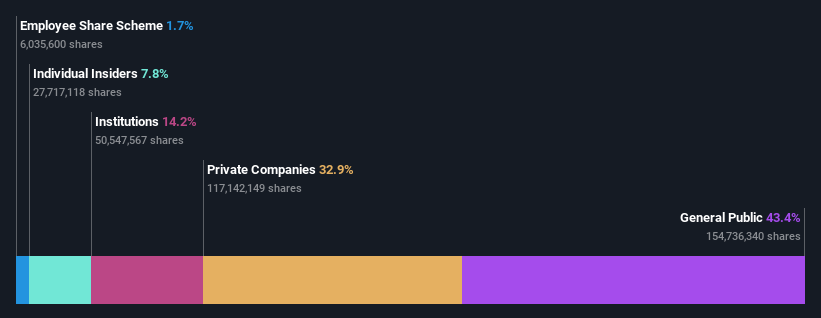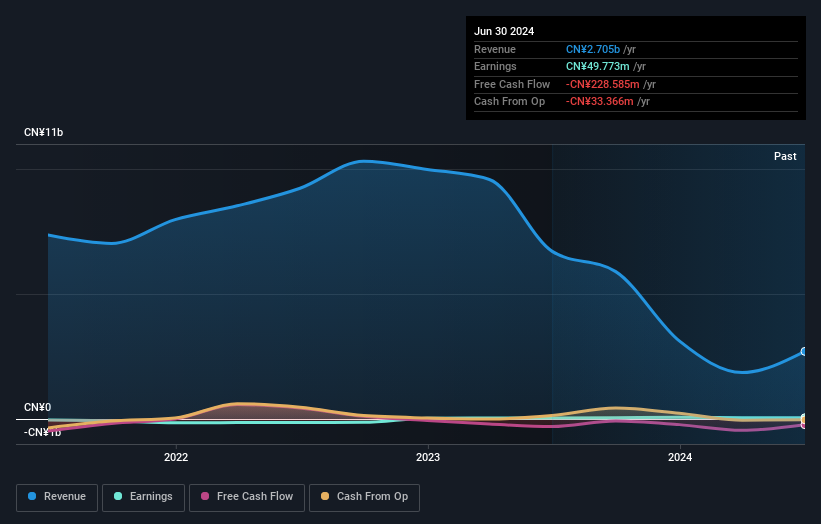Individual investors in Shanghai Lonyer Data Co., Ltd. (SHSE:603003) are its biggest bettors, and their bets paid off as stock gained 14% last week
Key Insights
- Significant control over Shanghai Lonyer Data by individual investors implies that the general public has more power to influence management and governance-related decisions
- A total of 6 investors have a majority stake in the company with 50% ownership
- 14% of Shanghai Lonyer Data is held by Institutions
A look at the shareholders of Shanghai Lonyer Data Co., Ltd. (SHSE:603003) can tell us which group is most powerful. With 43% stake, individual investors possess the maximum shares in the company. That is, the group stands to benefit the most if the stock rises (or lose the most if there is a downturn).
As a result, individual investors collectively scored the highest last week as the company hit CN¥1.7b market cap following a 14% gain in the stock.
Let's delve deeper into each type of owner of Shanghai Lonyer Data, beginning with the chart below.
Check out our latest analysis for Shanghai Lonyer Data

What Does The Institutional Ownership Tell Us About Shanghai Lonyer Data?
Many institutions measure their performance against an index that approximates the local market. So they usually pay more attention to companies that are included in major indices.
As you can see, institutional investors have a fair amount of stake in Shanghai Lonyer Data. This can indicate that the company has a certain degree of credibility in the investment community. However, it is best to be wary of relying on the supposed validation that comes with institutional investors. They too, get it wrong sometimes. When multiple institutions own a stock, there's always a risk that they are in a 'crowded trade'. When such a trade goes wrong, multiple parties may compete to sell stock fast. This risk is higher in a company without a history of growth. You can see Shanghai Lonyer Data's historic earnings and revenue below, but keep in mind there's always more to the story.

We note that hedge funds don't have a meaningful investment in Shanghai Lonyer Data. Shanghai Lonyer Holdings Co., Ltd. is currently the company's largest shareholder with 33% of shares outstanding. JT Asset Management Co., Ltd is the second largest shareholder owning 4.9% of common stock, and Guohua Life Insurance Co., Ltd, Asset Management Arm holds about 3.7% of the company stock.
We also observed that the top 6 shareholders account for more than half of the share register, with a few smaller shareholders to balance the interests of the larger ones to a certain extent.
Researching institutional ownership is a good way to gauge and filter a stock's expected performance. The same can be achieved by studying analyst sentiments. We're not picking up on any analyst coverage of the stock at the moment, so the company is unlikely to be widely held.
Insider Ownership Of Shanghai Lonyer Data
While the precise definition of an insider can be subjective, almost everyone considers board members to be insiders. Management ultimately answers to the board. However, it is not uncommon for managers to be executive board members, especially if they are a founder or the CEO.
Insider ownership is positive when it signals leadership are thinking like the true owners of the company. However, high insider ownership can also give immense power to a small group within the company. This can be negative in some circumstances.
Our most recent data indicates that insiders own some shares in Shanghai Lonyer Data Co., Ltd.. It has a market capitalization of just CN¥1.7b, and insiders have CN¥135m worth of shares, in their own names. It is good to see some investment by insiders, but it might be worth checking if those insiders have been buying.
General Public Ownership
The general public, who are usually individual investors, hold a 43% stake in Shanghai Lonyer Data. While this group can't necessarily call the shots, it can certainly have a real influence on how the company is run.
Private Company Ownership
Our data indicates that Private Companies hold 33%, of the company's shares. Private companies may be related parties. Sometimes insiders have an interest in a public company through a holding in a private company, rather than in their own capacity as an individual. While it's hard to draw any broad stroke conclusions, it is worth noting as an area for further research.
Next Steps:
I find it very interesting to look at who exactly owns a company. But to truly gain insight, we need to consider other information, too. For example, we've discovered 1 warning sign for Shanghai Lonyer Data that you should be aware of before investing here.
Of course this may not be the best stock to buy. Therefore, you may wish to see our free collection of interesting prospects boasting favorable financials.
NB: Figures in this article are calculated using data from the last twelve months, which refer to the 12-month period ending on the last date of the month the financial statement is dated. This may not be consistent with full year annual report figures.
Have feedback on this article? Concerned about the content? Get in touch with us directly. Alternatively, email editorial-team (at) simplywallst.com.
This article by Simply Wall St is general in nature. We provide commentary based on historical data and analyst forecasts only using an unbiased methodology and our articles are not intended to be financial advice. It does not constitute a recommendation to buy or sell any stock, and does not take account of your objectives, or your financial situation. We aim to bring you long-term focused analysis driven by fundamental data. Note that our analysis may not factor in the latest price-sensitive company announcements or qualitative material. Simply Wall St has no position in any stocks mentioned.
 Index Options
Index Options CME Group
CME Group Nasdaq
Nasdaq Cboe
Cboe TradingView
TradingView Wall Street Journal
Wall Street Journal